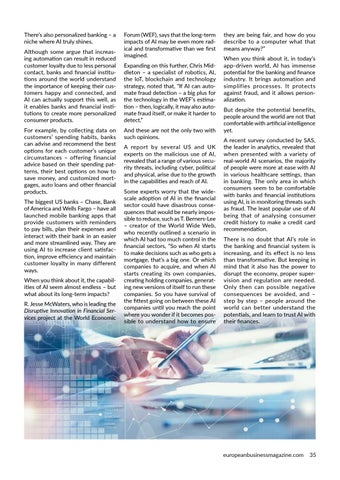There’s also personalized banking – a niche where AI truly shines. Although some argue that increasing automa on can result in reduced customer loyalty due to less personal contact, banks and financial ins tuons around the world understand the importance of keeping their customers happy and connected, and AI can actually support this well, as it enables banks and financial ins tu ons to create more personalized consumer products. For example, by collecting data on customers’ spending habits, banks can advise and recommend the best op ons for each customer’s unique circumstances – offering financial advice based on their spending patterns, their best op ons on how to save money, and customized mortgages, auto loans and other financial products. The biggest US banks – Chase, Bank of America and Wells Fargo – have all launched mobile banking apps that provide customers with reminders to pay bills, plan their expenses and interact with their bank in an easier and more streamlined way. They are using AI to increase client sa sfacon, improve efficiency and maintain customer loyalty in many different ways. When you think about it, the capabili es of AI seem almost endless – but what about its long-term impacts? R. Jesse McWaters, who is leading the Disrupࢼve Innovaࢼon in Financial Services project at the World Economic
Forum (WEF), says that the long-term impacts of AI may be even more radical and transforma ve than we first imagined. Expanding on this further, Chris Middleton – a specialist of robo cs, AI, the IoT, blockchain and technology strategy, noted that, “If AI can automate fraud detec on – a big plus for the technology in the WEF’s es maon – then, logically, it may also automate fraud itself, or make it harder to detect.” And these are not the only two with such opinions. A report by several US and UK experts on the malicious use of AI, revealed that a range of various security threats, including cyber, poli cal and physical, arise due to the growth in the capabili es and reach of AI. Some experts worry that the widescale adop on of AI in the financial sector could have disastrous consequences that would be nearly impossible to reduce, such as T. Berners-Lee – creator of the World Wide Web, who recently outlined a scenario in which AI had too much control in the financial sectors, “So when AI starts to make decisions such as who gets a mortgage, that’s a big one. Or which companies to acquire, and when AI starts creating its own companies, crea ng holding companies, generating new versions of itself to run these companies. So you have survival of the fi est going on between these AI companies un l you reach the point where you wonder if it becomes possible to understand how to ensure
they are being fair, and how do you describe to a computer what that means anyway?” When you think about it, in today’s app-driven world, AI has immense poten al for the banking and finance industry. It brings automation and simplifies processes. It protects against fraud, and it allows personaliza on. But despite the potential benefits, people around the world are not that comfortable with ar ficial intelligence yet. A recent survey conducted by SAS, the leader in analy cs, revealed that when presented with a variety of real-world AI scenarios, the majority of people were more at ease with AI in various healthcare se ngs, than in banking. The only area in which consumers seem to be comfortable with banks and financial ins tu ons using AI, is in monitoring threats such as fraud. The least popular use of AI being that of analysing consumer credit history to make a credit card recommenda on. There is no doubt that AI’s role in the banking and financial system is increasing, and its effect is no less than transforma ve. But keeping in mind that it also has the power to disrupt the economy, proper supervision and regulation are needed. Only then can possible negative consequences be avoided, and – step by step – people around the world can better understand the poten als, and learn to trust AI with their finances.
europeanbusinessmagazine.com
35
